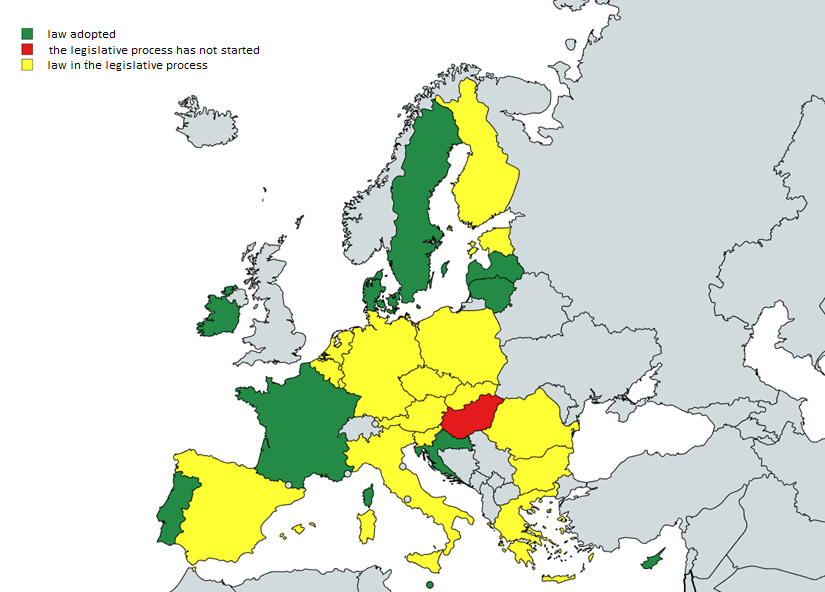
Authors: Lívia Djukić, František Kousal
In collaboration with: Kateřina Nešpůrková
The Directive (EU) 2019/1937 of the European Parliament and of the Council of 23 October 2019 on the protection of persons who report breaches of Union law (the “Whistleblowing Directive”) is undergoing the transposition process in most European countries, including the Czech Republic, where companies and the public sector have to deal with the direct effects of the Directive in the absence of a law transposing it. A number of our clients have already introduced an ethics hotline, also because they are required to have whistleblowing in place in other countries where they have branches. In which European countries are whistleblowers already legally protected? Look at our overview of how successful or unsuccessful the other 26 Member States are in transposing the Whistleblowing Directive into their legal systems.
Although the deadline to transpose the Whistleblowing Directive expired on 17 December 2021, the Czech Republic is by far not the only Member State that has not yet transposed the Directive into national law. To date, only 10 Member States have adopted a transposing law, namely Denmark, France, Croatia, Ireland, Cyprus, Latvia, Lithuania, Malta, Portugal and Sweden. A total of 16 Member States have not adopted any whistleblower protection law, with the respective bills facing various stages of the legislative process. And the only country that has not started drafting a bill is Hungary, with no prospect of adopting whistleblower protection any time soon.

Many Member States are struggling with their processes of transposing the Whistleblowing Directive. The transposition bills have been heavily criticised and extensively commented on, and in some cases completely rewritten. For example, the Romanian Constitutional Court has already ruled on the constitutionality of the bill passed in Romania. Although the court did not find it in contravention to the constitutional system, the Romanian president decided to return the bill to the Parliament for reconsideration after all. As a result, the legislative process is taking longer in many countries than originally expected.
Before the Whistleblowing Directive was passed, some countries already provided whistleblowers with a certain (whether higher or lower) standard of protection, which helped them transpose the new EU Directive in a slightly easier way. For example, France has amended its existing anti-corruption law known as Sapin II, and countries such as Ireland, Romania, the Netherlands, and Slovakia have also availed themselves of their existing laws.
However, whistleblower protection has no tradition in most EU countries. It is therefore interesting to follow individual Member States introducing various whisteblowing and whistleblower protection rules, albeit based on a common European framework. Some countries are going beyond the Whistleblowing Directive. Spain, for example, plans to incentivise persons participating in a breach of laws to come forward by introducing a clemency programme (a less severe punishment for the perpetrator – whistleblower in the subsequent criminal proceedings). Germany wants to protect whistleblowers who report not only breaches of laws in the areas defined by the Whistleblowing Directive, but also any criminal offence and selected administrative transgressions under German law. Austria goes a step further by planning to protect whistleblowers reporting corrupt conduct, regardless of the area in which the corruption occurred.
During the transposition process, other jurisdictions find themselves in conflict with the Whistleblowing Directive. For example, the current Slovak Whistleblower Protection Act provides for a 90-day period to examine the received whistleblower report, with a possible extension of another 30 days. The draft amendment takes no account of the fact that the Whistleblowing Directive imposes a time limit of 3 months to investigate a report without the possibility of further extension.
The European Commission’s interpretation of the introduction of group reporting systems, according to which corporations with more than 249 employees cannot share reporting systems, also appears problematic. As opposed to this interpretation, large countries such as Germany, France or Spain allow group companies to share a reporting system regardless of their size. The same approach is taken by Denmark and Austria. We often advise our clients who are part of larger concerns based in these countries on how to deal with pressure from their parent companies to introduce a group system in the context of the upcoming Czech regulation, which does not provide for such a solution and requires each company with more than 249 employees to have its own reporting system.
Austria is tinkering with the data protection rules in proposing to provide for a retention period of up to 30 years (the period for which information on the reporting may be stored), which may contradict the principle of limiting the storage of personal data to the strictly necessary period.
What we also find interesting is the approach of individual countries to fines for breaches of legal obligations. Some countries such as Croatia, Slovenia or Latvia have introduced purely symbolic fines, with their maximum amount not exceeding several thousand euros. On the other hand, Portugal, Lithuania and Ireland have enacted fines of up to €250,000. The most severe punishment for offenders is planned in Belgium, where financial penalties can reach up to 5% of the total annual turnover, and Estonia, whose bill provides for fines of up to €400,000.
The process of transposing the Whistleblowing Directive will continue in Europe for some time. In the Czech Republic, we are already familiar with the text of the bill, and since we know that the implementation process can take several weeks (especially in larger companies), it is wise to start preparing for whistleblowing early enough. We recommend that when preparing your ethics hotline, you should check the current state of transposition both in the Czech Republic and all EU countries where you conduct your business. Only a suitable, tailored design of the ethics hotline can help you save the cost of running it, but also eliminate the risks resulting from non-compliance with the whistleblower protection requirements in foreign jurisdictions.
| Member State | Transposition | Legislative status |
| Belgium | NO | The bill is expected to be passed in autumn 2022. |
| Bulgaria | NO | The bill is being considered. |
| Czechia | NO | The bill is being considered. |
| Denmark | YES | The bill was passed on 4 June 2021. |
| Estonia | NO | The bill is considered. |
| Finland | NO | The bill is expected to be passed by the end of 2022. |
| France | YES | The bill was passed on 2 September 2022. |
| Croatia | YES | The bill was passed on 23 April 2022. |
| Ireland | YES | The bill was passed on 21 July 2022. |
| Italy | NO | The bill is drafted. |
| Cyprus | YES | The bill was passed on 20 January 2022. |
| Lithuania | YES | The bill was passed on 16 December 2021. |
| Latvia | YES | The bill was passed on 28 January 2022. |
| Luxembourg | NO | The bill is being considered. |
| Hungary | NO | The drafting of the bill has not yet started. |
| Malta | YES | The bill was passed on 16 November 2021. |
| Germany | NO | The bill is expected to be passed in autumn 2022. |
| Netherlands | NO | The bill is being considered. |
| Poland | NO | The bill is being considered. |
| Portugal | YES | The bill was passed on 26 November 2021. |
| Austria | NO | The bill is expected to be passed in autumn 2022. |
| Romania | NO | The bill is being considered. |
| Greece | NO | The bill is drafted. |
| Slovakia | NO | The bill is being considered. |
| Slovenia | NO | The bill is being considered. |
| Spain | NO | The bill is being considered. |
| Sweden | YES | The bill was passed on 28 October 2021. |